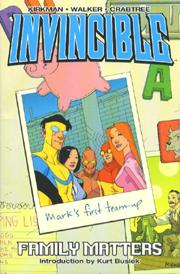| Invincible:
Family Matters
If
you've read some of my previous reviews, you might have noticed
that I tend to say that I still love the superhero genre in
comics, and yet of my last twenty reviews, five were actually
from the genre that comprises the majority of product in the
comic book industry. On the one hand, this is great because
it shows that comics have grown and branched out into other
realms of fiction. On the other hand, it shows that I may
be neglecting what got me into comics in the first place:
superheroes.
But it's
hard to stay with the superhero genre a lot of the time. Part
of it is from the "it's been done to death" attitude
that plagues many a fanperson. I mean, how many times can
we hear the story of Captain Mighty-Pants' origin without
it getting old: how he was found in an alien space craft,
then his parents were murdered, after he was bitten by a radioactive
pair of corduroys, and vowed to keep the world safe from dryer-heated
zippers and Baby Gap?
It's hard
to read (and probably write) a straight superhero tale without
getting too boring or repetitive. I tend to gravitate toward
books that include superheroics, but don't feature them at
the center of the story, books like Powers, Planetary,
and Astro City. Even Daredevil has taken on
a more "crime drama" slant to it than "superhero."
So when
I cam across Invincible: Family Matters, I was surprised
to find a good, straightforward tale about a superhero in
the beginning of his career.
Mark Grayson
is in high school, and thanks to his father Omni-Man, Defender
of Democracy, Mark is finally coming into the super powers
that he was more than likely to have start showing up. He
can fly, he's super-strong, and there's always his titular
invincibility to help him in a fight, as he decides to enter
into the family business and become a superhero.
Maybe
the reason I love this book is the novel (depending on your
point of view) approach to the "coming of age" story
that has become a comic book mainstay since the days of Spider-Man-in-high-school.
Robert Kirkman manages to write an origin without a hook:
there's no guilt over the loss of a parent or the death of
a loved one, there's no great responsibility to the service
of justice, nor is there some conspiracy or lurking evil behind
the scenes that's just waiting to pop out and rattle our protagonist.
Mark has
superpowers. His father is a superhero. It's been expected
since birth that he would get powers one day, and his parents
are not surprised, upset, overly concerned about the danger
it poses to Mark, or any other stereotypical reaction a set
of parents from the superhero genre would have. The normality
of the situation (filtered through the eyes of the Graysons)
is just so refreshing to see. Mark becomes a superhero because
really, what else would you do with powers if a superhero
dad and an accepting, loving mother raised you?
The family
dynamic in the book is strong, but it doesn't overpower the
adventure aspect, merely complementing it here and there.
The scenes with Mark's mom are always interesting and it really
demonstrates the strength of her character, to live and love
two superheroes and still be a great mom.
The artwork
is top-notch. Corey Walker pencils and self-inks and I've
rarely seen an artist capture the iconic nature of superheroes
so well. His lines are perfectly clean, and he matches the
light-hearted tone of the book by not overdoing the inks.
In fact,
the lack of dense inks plays incredibly well with the Bill
Crabtree's colors. The color is vibrant and really brings
alive the characters and settings in the book, and it greatly
reminds me of the excellent work of Jeremy Cox on Leave
It To Chance.
The book
is a fun read that manages to be new, and almost free from
cliché. The sketch gallery in the back is good and
gives the reader some insight to Walker and Kirkman's original
designs, and the introduction by Kurt Busiek simply adds more
to an already great book. And it's not breaking the bank at
$12.95 either.
Buy it
and remember what got you into comics in the first place (I
guarantee you it probably wasn't Scott Morse or Crumb that
caught your eye at twelve or thirteen….well, maybe Crumb).
|






